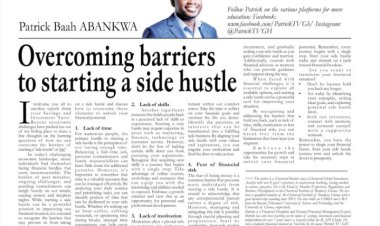HOW TO CRAWL OUT OF POVERTY

Welcome to another week of financial learning. This week I want to touch on the topic of personal financial management. The whole scope of financial personal financial management starts with having mental emancipation.
We need to elevate our minds when it comes to money. Many working-class attend to the medical doctor when they fall sick, the lawyer when they have legal matters but feel they can easily manage their own monies! This is the main reason why many people work for years but retire as burdens for their families. I believe this tide has to change.
It has to change NOW! It will be changing with the help of a personal budget and the aid of financial coaches. Managing your personal finances is simply having a clear and objective vision for your finances. Managing your finances goes beyond just saving a portion of your income. It involves having a budget for your income as well as taking into account financial risks and unknown future invests. This topic is often neglected in our part of the world. However, this forms the basis of creating wealth.
A personal budget simply means have a laid-down structure of how much income you are earning or want to earn and how you intend exhausting it. We will learn a simple personal budget in this section.
Before that, I want us to appreciate the fact that managing your finances goes beyond just money. It includes your time and any other form of resources. There is an old adage that says “Time is Money”.
It is so because time lost may never be regained just like money. If you lose your money through wrong and uninformed investment, it ends there! It is therefore of great importance that we consciously put our ears and mind to the personal budget that we are about to discuss. I have done a lot of research on the components of a personal budget in terms of percentages for various expenses line. I have therefore come to believe that the list below can help push us to the next level financially.
PERSONAL BUDGET Before we draw a simple personal budget, I want us to appreciate the components below as a guide;
| Tithe | 10% |
| Housing | 25-35% |
| Utilities | 5-10% |
| Transportation | 10-15% |
| Food | 5-15% |
| Investment/Savings | 5-10% |
| Debt payment | 5-10% |
| Healthcare | 5-10% |
| Charity(Giving) | 5-10% |
| Miscellaneous | 2-7% |
From the table above, our rent should not be more than 35% of our monthly income. Income here includes both your salary and aside businesses. If you go over this margin, chances are that your savings fraction will either reduce or diminish. In our subsequent discussion, I will speak more about creating aside businesses. As we are also aware, Tithe is at a non-negotiable rate of 10% for Christians. With the above said, a simple personal budget will look like this;
| PERSONAL BUDGET WORKSHEET | ||
| (Spending Plan) | ||
| MONTH: | ||
| INCOME: | Budget | Actual |
| Salary/Income | ||
| Partner's Salary | ||
| Total Income | GHC | GHC |
| EXPENSES: | ||
| Living/Housing: | ||
| Rent/Mortgage | ||
| Electric | ||
| Water/Sewer | ||
| Gas/Heating | ||
| Telephone | ||
| Cable TV | ||
| Household/Repairs | ||
| Regular Payments: | ||
| Student Loan | ||
| Credit Cards | ||
| Other Loan Payments | ||
| Health Insurance | ||
| Car/Home Insurance | ||
| Life Insurance | ||
| Child Care | ||
| Food Expenses: | ||
| Groceries | ||
| Restaurant Meals | ||
| Personal Expenses: | ||
| Personal Care | ||
| Hair/Nail Care | ||
| Clothing/Shoes | ||
| Doctors, Dentists, etc. | ||
| Prescriptions | ||
| Laundry/Dry Clean | ||
| Recreation/Travel | ||
| Transportation: | ||
| Gas/Auto Expenses | ||
| Bus, Taxi, Train, etc. | ||
| Parking | ||
| Miscellaneous: | ||
| Church | ||
| Gifts/Charity | ||
| Savings | ||
| Total Expenses: | GHC | GHC |
| TOTAL INCOME MINUS TOTAL EXPENSES: | GHC | GHC |
Above the table is a typical personal budget that we all need to understand and adopt. With the income column, we are expected to fill in our current income streams. Both current employment and any other source if any. We then fill out the specific expenses line keeping in mind the percentages as stated above.
The purpose of the personal budget is to make your discipline and stay within your means. The bottom-line for the budget should be NIL or zero. Your income should be matching the expenses. Expenses here include your savings and tithe. Trust me, you are likely to get a negative deficit if you slot your current expenses against your income in this table.
I will end by saying Financial Independence is possible for those who plan towards it.

 baasco2006
baasco2006 















